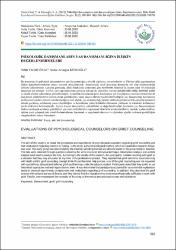Psikolojik danışmanların yas danışmanlığına ilişkin değerlendirmeleri
Künye
Yıldız Önal, Y. ve Köseoğlu, S. A. (2021). Psikolojik danışmanların yas danışmanlığına ilişkin değerlendirmeleri. Abant İzzet Baysal Üniversitesi Eğitim Fakültesi Dergisi, 21(2), 592-604. https://dx.doi.org/10.17240/aibuefd.2021.21.62826-786793Özet
Bu araştırma ile psikolojik danışmanların yas danışmanlığına yönelik algılarını, deneyimlerini ve Türkiye’deki uygulamalarailişkin değerlendirmelerini ortaya koymak amaçlanmıştır. Araştırmada, nitel araştırma deseninde yer alan fenomenolojikyöntem kullanılmıştır. Çalışma grubunda, ölçüt örnekleme yöntemine göre belirlenen, İstanbul’da ikamet eden 10 psikolojikdanışman yer almıştır. Veriler, yarı yapılandırılmış görüşme tekniği ile yöneltilen sorular yoluyla elde edilip, betimsel analizve içerik analizi kullanılarak çözümlenmiştir. Araştırma sonuçlarına göre, katılımcılar yas ile çalışmayı mesleki süreçte her ankarşılarına çıkabilecek bir durum olarak gördüklerini; yasın sadece ölümle ilişkilendirilmediğini; yas danışmanlığı kavramınınprofesyonel yardım sürecini sınırlandırdığını; özel olarak, yas danışmanlığı yardım talebiyle gelinmese bile çalışılan konularınaltında gecikmiş, ertelenmiş yasın çıkabildiğini ve kendilerine yakın buldukları kuramsal yaklaşım ve teknikleri kullanmayıtercih ettiklerini belirtmişlerdir. Ayrıca, kişisel deneyimleri, yetkinlikleri ve değerlendirmeleri üzerinden yas danışmanlığınailişkin varoluşsal açıklama getirdikleri; yas sürecini kültürel ve toplumsal faktörlerle nitelendirdikleri; mesleki açıdan aldıklarıeğitimi yasla çalışmak için yeterli bulmadıklarını; kuramsal ve uygulamalı derslere ve eğitimlere ağırlık verilmesi gerekliliğinivurguladıkları ortaya konmuştur. The aim of this study is to reveal the perceptions and experiences of psychological counselors regarding grief counseling and their evaluations regarding practice in Turkey. In the study, a phenomenological method, which is a qualitative research design, was used. The study group was determined by the criterion sampling method and all participants in the group reside in Istanbul. The data were obtained through questions posed by the semi-structured interview technique. Descriptive analysis and content analysis were used to analyze the data. According to the results of the research, the participants consider working with grief as a situation that they may encounter at any time in the professional process. They reported that grief cannot be associated only with death and the grief counseling concept limits the professional help process, even if the grief counseling was not requested with special help, delayed and deferred grief could emerge under the subjects studied. Participants stated that they prefer to use theoretical approaches and techniques close to them. It was determined that participants accounted for an existential explanation based on personal experiments, competencies and evaluations regarding grief counseling. In addition, they described the grief process with cultural and social factors, and they did not find the education they received professionally sufficient to work with grief. Finally, they emphasized the necessity of focusing on theoretical and practical courses and educations.
Kaynak
Abant İzzet Baysal Üniversitesi Eğitim Fakültesi DergisiCilt
21Sayı
2Bağlantı
https://dx.doi.org/10.17240/aibuefd.2021.21.62826-786793https://hdl.handle.net/20.500.12511/8659


















